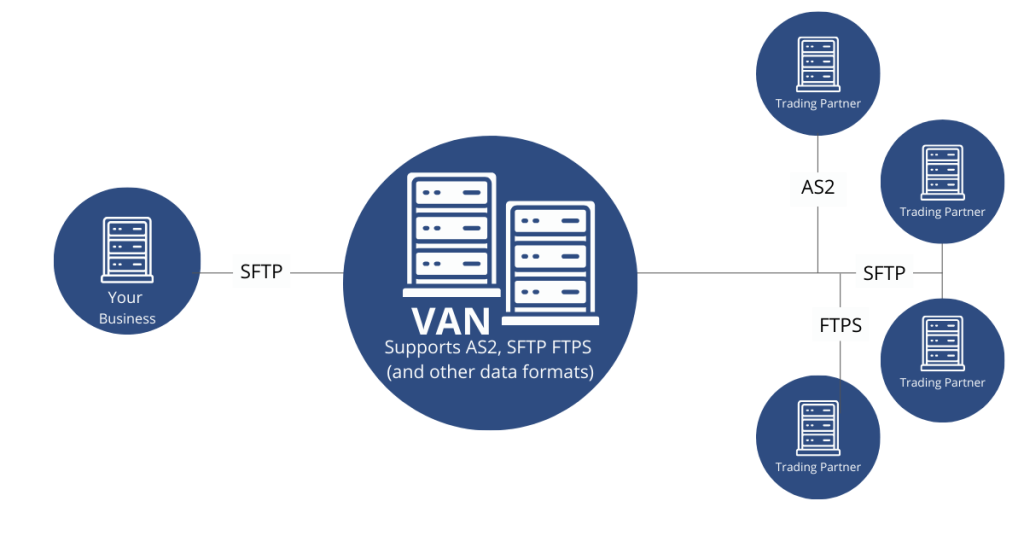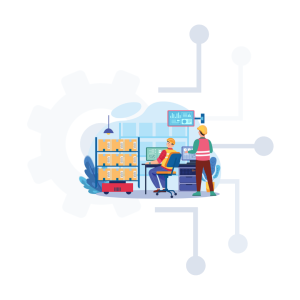A value-added network (VAN) is important for businesses that rely on electronic data interchange (EDI) for their communication and transactional needs. It can help businesses improve their efficiency, reduce costs, and enhance their competitive edge. This blog discuss the top 25 benefits of value added network

Introduction
In today’s fast-paced business world, efficient and secure communication is essential for success. A Value Added Network (VAN) acts as an intermediary between businesses, ensuring that data is transmitted between trading partners securely and efficiently. VAN also provides a range of other benefits for businesses which include data translation, message routing, and data transformation.
VANs use advanced encryption and security protocols to ensure that data is transmitted safely and securely between trading partners. This helps to protect sensitive business information from cyber threats and data breaches. It offers reliable data exchange, ensuring that messages are delivered to their intended recipients in a timely and efficient manner. This helps to reduce errors and improve communication between businesses, ultimately leading to better collaboration and stronger partnerships. Additionally, third-party VAN providers often offer other value-added services such as real-time tracking, secure mailbox, duplicate control, data validation, and reporting, further enhancing communication and collaboration between businesses.
Another big advantage of using a VAN network is its scalability and flexibility. As businesses grow and expand, their communication needs may change. A VAN can easily adapt to these changing needs, allowing businesses to add or remove trading partners as needed. Additionally, VANs can support a wide range of communication protocols and file formats, making it easy for businesses to communicate with partners using different systems. This flexibility and scalability can help businesses stay competitive and adapt to changing market conditions.
Here are the top 25 benefits of Value Added Network
1. Improved Data Accuracy
VAN provides data validation and formatting services, reducing errors and ensuring data accuracy in electronic transactions.
2. Enhanced Security
VAN’s use secure protocols and encryption techniques to protect data transmitted between trading partners, reducing the risk of data breaches.
3. Simplified EDI Implementation
Provides easy-to-use interfaces and tools for setting up and managing EDI connections, simplifying the implementation process for businesses.
4. Increased Operational Efficiency
Automates the exchange of data, reducing manual data entry and processing, which helps to streamline business operations.
5. Faster Transaction Processing
Enables real-time or near real-time transaction processing, reducing transaction times and improving supply chain efficiency
6. Cost Savings
Eliminate the need for businesses to build and maintain their own EDI infrastructure, which can result in cost savings in hardware, software, and maintenance.
7. Scalability
Can handle large volumes of data and transactions, making them scalable to accommodate business growth.
8. Global Reach
VANs have extensive networks that can facilitate EDI transactions with trading partners around the world, enabling global supply chain integration.
9. Increased Visibility
Provides visibility into the status of transactions, enabling businesses to track and monitor the flow of data in real-time.
10. Improved Customer Service
Enables faster order processing and response times, leading to improved customer service levels.
11. Enhanced Business Relationships
Helps businesses establish and maintain electronic connections with their trading partners, facilitating efficient communication and collaboration
12. Simplified Compliance
Can help businesses comply with industry-specific EDI standards and regulations, ensuring that data is exchanged in a compliant manner.
13. Reduced Paperwork
Eliminates the need for paper-based transactions, reducing the cost and time associated with manual data entry and processing.
14. Increased Data Visibility
Provides businesses with better visibility into their data, enabling them to analyze and leverage data for strategic decision-making.
15. Improved Accuracy of Order Processing
Automates the exchange of orders, reducing the risk of errors associated with manual order processing.
16. Faster Invoice Processing
VANs enable electronic invoicing, reducing the time and effort required for invoice processing.
17. Enhanced Inventory Management
Enables real-time visibility into inventory levels, helping businesses optimize their inventory management processes.
18. Reduced Lead Times
Achieve faster communication and transaction processing, reducing lead times in the supply chain.
19. Improved Cash Flow Management
Facilitate faster payment processing and reduce the need for paper-based transactions, improving cash flow management for businesses.
20. Increased Trading Partner Connectivity
Providing businesses with a single connection point to multiple trading partners, simplifying connectivity and reducing the need for multiple point-to-point connections.
21. Enhanced Order Tracking
Real-time order tracking capabilities, enabling businesses to track the status of orders throughout the supply chain.
22. Better Supplier Collaboration
Facilitate efficient communication and collaboration with suppliers, improving supplier relationships and reducing order fulfillment delays.
23. Reduced Manual Data Entry
Automate the exchange of data, reducing the need for manual data entry and associated errors.
24. Improved Order Accuracy
VANs provide data validation and formatting services, reducing order errors and improving order accuracy.
25. Increased competitive advantage:
By leveraging the benefits of VANs, businesses can improve their operational efficiency, reduce costs, and enhance their supply chain management, resulting in a competitive advantage in the marketplace.
Conclusion
Value added network (VAN) can offer numerous benefits to businesses that rely on electronic data interchange (EDI) for their communication and transactional needs. VANs provide a secure and reliable platform for exchanging EDI messages with trading partners, ensuring the integrity and confidentiality of data. Additionally,
VANs offer value-added services such as data transformation, translation, and mapping, which can help streamline business processes and reduce errors. VANs also provide real-time visibility and tracking capabilities, enabling businesses to monitor and manage their EDI transactions efficiently. Finally, by outsourcing their EDI requirements to a VAN, businesses can save on costs associated with managing an in-house EDI infrastructure. Overall, the use of a VAN can help businesses improve their efficiency, reduce costs,
Want to learn more about VAN?
Here is the complete guide to value added network
Want to learn more about Commport Value Added Network?
Download: VAN Buyers Guide
Maximize your business efficiency with the right VAN provider! Grab your free VAN Buyer's Guide and discover the key features and services that will elevate your EDI transactions to the next level.
Make an informed decision today!
Frequently Asked Questions
A VAN is a third-party service provider that offers a secure and reliable platform for businesses to exchange electronic data interchange (EDI) messages with their trading partners. VANs also offer value-added services such as data transformation, translation, and mapping.
Using a VAN for EDI provides several benefits, including improved data security, reliability, and confidentiality. VANs also offer value-added services that can help streamline business processes and reduce errors, as well as real-time visibility and tracking capabilities. Outsourcing EDI requirements to a VAN can also help businesses save on costs associated with managing an in-house EDI infrastructure.
While a VAN provides a platform for businesses to exchange EDI messages, an EDI translator is software that helps convert EDI data into a format that can be understood by the receiving system. A VAN may offer EDI translation as a value-added service, but it is not the same as an EDI translator.
The cost of using a VAN can vary depending on factors such as the volume of EDI transactions, the number of trading partners, and the level of value-added services required. Some VANs charge a flat fee, while others charge based on usage. It’s best to contact a VAN provider directly to get a customized quote.
No, using a VAN is not mandatory for EDI, but it is highly recommended. While businesses can technically set up their own EDI infrastructure, doing so can be time-consuming, costly, and risky in terms of data security. Using a VAN provides a more secure, reliable, and cost-effective option for exchanging EDI messages with trading partners.





